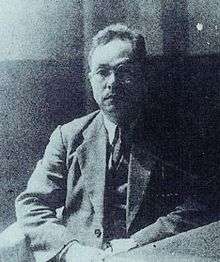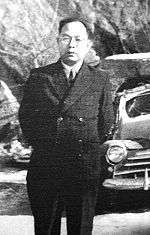Pak Hon-yong
| Pak Hon-yong | |
|---|---|
 Pak Hon-yong in 1946 | |
| Born |
28 May 1900 Yesan, South Chungcheong Province, Korea |
| Died |
December 1955? Pyongyang, DPRK |
| Nationality | Korean |
| Education | Kyŏngsŏng Ordinary High School(1919) |
| Alma mater | KyungKi High School |
| Known for |
Korean independence activists Nationalist Journalist Athlete (Sportsperson) Revolutionary |
| Spouse(s) | Joo Se-juk, Jung Sunnyen, Yi Sunkeum, Yun Lena |
| Children |
Daughter: Vivian Park, Nathesa Park Son: Park Byungsam |
| Parent(s) |
Lee Hakkyu (Mother) Park Hyin-ju (Father) |
| Pak Hon-yong | |
| Hangul | 박헌영 |
|---|---|
| Hanja | 朴憲永 |
| Revised Romanization | Bak Heon-yeong |
| McCune–Reischauer | Pak Hŏnyŏng |
| Pen name | |
| Hangul | 이정, 이춘 |
| Hanja | 而丁, 而靜, 而春 |
| Revised Romanization | Ijeong, Ichoon |
| McCune–Reischauer | Ijŏng, Ichun |
| Courtesy name | |
| Hangul | 덕영 |
| Hanja | 德永 |
| Revised Romanization | Dŏnyŏng |
| McCune–Reischauer | Deok-yeong |
Pak Heon-yeong (Hangul: 박헌영, Hanja:朴憲永, 28 May 1900 – December 1955?) was a Korean independence activist, politician, philosopher and Communist activist. One of the main leaders of the Korean communist movement during Japan's colonial rule (1910–45). his nickname was Ijung (이정) and Ichun (이춘), courtesy name was Deokyeong (덕영).
During the Japanese occupation of Korea, he tried to organize the Korean Communist Party. However, when the Japanese authorities cracked down on the party, he went into hiding. After Korea's liberation, August 1945, he set up the Korean Communist Party organization in the South, but under pressure from US authorities he moved to North Korea in April 1948. He attended a meeting with Kim Gu and Kim Kyu-sik on the subject of Korean reunification. He participated in collaboration with Kim Il-Sung in the Korean War. In 1955, he was executed by Kim Il-Sung's security forces as an American spy.[1]
Life
Early life
Pak was born to a yangban family of the Yeonghae Park lineage in Sinyang-myeon, Yesan County, Chungcheongnam-do. However, he was the illegitimate son of a concubine.
In 1919, he graduated from Kyŏngsŏng Ordinary High School, now Kyunggi High School.[2] In March 1919, he was involved in the March 1st Movement and later independence movements.
Political activities
In 1921, he joined the Shanghai branch of the Korean Communist Party, Irkutsk faction. At this time, he was secretary of the Korean Communist Youth League. In January 1922, he participated in the Comintern Far East People's Representative Council in Moscow.
Pak Hon-yong was arrested in Korea in April 1922 and was charged with being a Communist Party organizer. He was released in 1924 and became active as a reporter for the newspapers Dong-a Ilbo and Chosun Ilbo.
Underground
On 18 April 1925, Pak Hon-yong became one of the founders of the Korean Communist Party. From this point until the end of World War II his activities were clandestine.
In 1926, he appeared in court. During the trial, he feigned insanity and ate feces, with the result that he was acquitted in November of that year. Afterwards, he was confined to his home due to his supposed ill-health, but in December he escaped by way of Manchuria to reach the Soviet Union. It was only then that the Japanese realized that he was feigning madness.
In Russia, he was educated in Communism, returning home in 1940. Back in Korea, he was active in the resistance to Japanese rule.
After World War II
Late in August 1945, the Korean Communist Party was re-established, having been officially disbanded in 1928, and Pak became its secretary. On 5 January 1946, as a representative of the Korean Communist Party, he announced at a foreign and domestic press conference that, supporting the decision of the Moscow conference of great powers (UK, US, Soviet Union), Korea was now in the process of a "democratic revolution".
In December 1946, he organized the South Korean Workers' Party, and became its first secretary.
South and North Korea negotiations and life in North Korea
In April 1948, he visited North Korea for negotiations, along with Kim Gu and Kim Kyu-sik. In May 1948, the negotiations ended, and he remained in the North.
In September 1948, while keeping his role as secretary of the South Korean Workers' Party, he became Deputy Prime Minister and Foreign Minister of North Korea.[1]
Pak Hon-yong became secretary of the Korean Workers' Party when the North and South parties united in April 1950. Pak was the vice chairman of the Politburo of the DPRK from 1949 to 1953.[1] Pak was Foreign Minister of the DPRK until he was ousted and arrested in 1953.[1]
Arrest and death

Pak Hon-yong was arrested on 3 August 1953 in a purge of the South Korean Workers' Party faction by Kim Il-sung.[1] On 15 December 1955, he was sentenced to death for espionage. The date of Pak's death is uncertain, though sources suggest that he was executed that same month.[3][4][5]
Works
- Modern society and our duty
- Historical viewed of Christian inner
See also
- Kim Gu
- Kim Il-Sung
- Kim Kyu-sik
- Kim Won-bong
- Yuh Woon-Hyung
- Korean independence movement
- Politics of North Korea
- List of Korea-related topics
References
- 1 2 3 4 5 Lankov, Andrei (2013). The Real North Korea. Oxford University Press. pp. 13 to 14. ISBN 978-0-19-996429-1.
- ↑ "영해박씨 박헌영". Bakssi Jokbo website. Retrieved 11 April 2006.
- ↑ Suh, Dae-Sook (1988). Kim Il Sung: The North Korean Leader. New York: Columbia University Press. p. 136. ISBN 9780231065733.
- ↑ Paige, Glenn D.; Lee, Dong Jun (1963). "The Post-War Politics of Communist Korea". The China Quarterly (14): 17–29.
- ↑ Deane, Hugh (1996). "Review of The Origins of the Korean War by Bruce Cumings". Science & Society. 60 (2): 252–254.
External links
| Wikimedia Commons has media related to: |
- Korea Times article by Andrei Lankov
- Brief profile
- Pak Hon-Yong:Nate
- 남로당지도자 박헌영 자료집 내는 아들 圓鏡스님
- 아버지 전집 펴내는 ‘박헌영 아들’ 원경스님
- "박헌영이 미제 간첩? 제국주의와 맞서 싸운 애국자" 오마이뉴스 2010년 01월 04일자
- 부러져버린 ‘인민의 고무래’ 박헌영 ① 경향신문
- 부러져버린 ‘인민의 고무래’ 박헌영 ② 경향신문
- 이정식 교수, '여운형은 박헌영파에 암살' 주장 - 동아일보 매거진
- 조선공산당과 남로당 당수 박헌영 (1)
- 조선공산당과 남로당 당수 박헌영 (2)
| Preceded by - |
Leader of Joseon Communist Party 1927-1946 |
Succeeded by - |